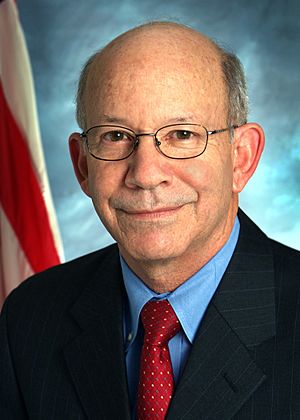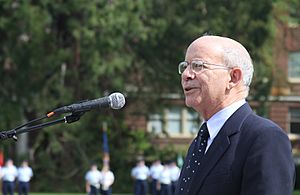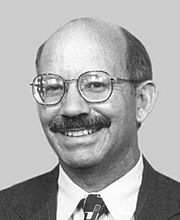Peter DeFazio facts for kids
Quick facts for kids
Peter DeFazio
|
|
|---|---|
 |
|
| Chair of the House Transportation Committee | |
| In office January 3, 2019 – January 3, 2023 |
|
| Preceded by | Bill Shuster |
| Succeeded by | Sam Graves |
| Chair of the Congressional Progressive Caucus | |
| In office January 3, 2003 – January 3, 2005 |
|
| Preceded by | Dennis Kucinich |
| Succeeded by | Barbara Lee and Lynn Woolsey |
| Member of the U.S. House of Representatives from Oregon's 4th district |
|
| In office January 3, 1987 – January 3, 2023 |
|
| Preceded by | Jim Weaver |
| Succeeded by | Val Hoyle |
| Personal details | |
| Born |
Peter Anthony DeFazio
May 27, 1947 Needham, Massachusetts, U.S. |
| Political party | Democratic |
| Spouse | Myrnie Daut |
| Education | Tufts University (BA) University of Oregon (MA) |
| Signature | |
| Military service | |
| Allegiance | |
| Branch/service | |
| Years of service | 1967–1971 |
| Unit | Air Force Reserve Command |
Peter Anthony DeFazio (born May 27, 1947) is an American politician who served in the United States House of Representatives. He represented Oregon's 4th congressional district from 1987 to 2023. As a member of the Democratic Party, he helped create the Congressional Progressive Caucus.
DeFazio grew up in Massachusetts and served in the United States Air Force Reserve. Before joining Congress, he was a county commissioner in Lane County, Oregon. On December 1, 2021, DeFazio announced he would not run for reelection in 2022, ending his long career in Congress.
Contents
Early Life and Career
Peter DeFazio was born in Needham, Massachusetts, a town near Boston. He graduated from Needham High School in 1965. He said his great-uncle helped shape his political views by showing a strong dislike for the Republican party.
From 1967 to 1971, DeFazio served in the U.S. Air Force Reserve. He earned a bachelor's degree from Tufts University in 1969. Later, he moved to Oregon and earned a master's degree from the University of Oregon in 1977, where he studied gerontology (the study of aging).
Before becoming a politician himself, DeFazio worked as an assistant for U.S. Representative Jim Weaver from 1977 to 1982. In 1983, he was elected as a commissioner for Lane County.
U.S. House of Representatives
In 1986, DeFazio decided to run for Congress when Representative Jim Weaver retired. He won a close primary election against two other Democrats and then won the main election with 54% of the vote.
For many years, DeFazio won his elections easily. His strongest support came from Lane County, where many of his voters lived. His district was considered competitive, but voters continued to reelect him. In 2020, he won his last election against Alek Skarlatos by more than 25,000 votes.
Tenure in Congress

DeFazio was known for his progressive political views. In 1992, he co-founded the Congressional Progressive Caucus with other members of Congress, including Bernie Sanders. This group supports progressive policies.
DeFazio was a strong voice for his beliefs. For example, during the 1999 World Trade Organization meetings in Seattle, he joined protesters who were concerned about how global trade policies affected workers and the environment.
Working on Transportation and Infrastructure
DeFazio spent his entire career on the Transportation and Infrastructure Committee. This committee works on laws related to roads, bridges, airports, and public transit. In 2018, he became the chairman of the committee.
In 2020, he sponsored the Moving Forward Act, a bill that aimed to invest $1.5 trillion in America's infrastructure. Although that specific bill did not pass, he later helped pass the Infrastructure Investment and Jobs Act. This major law provided billions of dollars to improve the nation's infrastructure.
Investigating the Boeing 737 MAX
As chairman of the Transportation Committee, DeFazio led an important investigation into two plane crashes involving the Boeing 737 MAX. These crashes led to the deaths of 346 people.
His committee's 18-month investigation found serious mistakes in the plane's design and in how it was approved by the Federal Aviation Administration (FAA). The investigation led to a new law in 2020 that reformed how airplanes are certified for safety. The story of this investigation was featured in the 2022 Netflix documentary Downfall: The Case Against Boeing.
Other Key Issues
- Immigration: DeFazio supported protections for "Dreamers," young immigrants brought to the U.S. as children. He also spoke out against immigration policies he felt were unfair.
- Military Spending: He often voted against increasing the U.S. military's budget. He also voted against the Patriot Act, a law passed after the 9/11 attacks, because he was concerned it took away civil rights from Americans.
- Postal Service: DeFazio worked for years to help the United States Postal Service. He introduced a bill to remove a rule that forced the Postal Service to save billions of dollars for future retiree health benefits. This change became law in 2022, helping the Postal Service become more financially stable.
- Financial Reform: After the 2008 financial crisis, DeFazio proposed a small tax on financial trades to help pay for government programs. He was one of only seven Democrats who voted against a major economic recovery bill in 2009 because he felt it gave too many tax cuts instead of funding projects like education and infrastructure.
- Organic Farming: DeFazio was a strong supporter of organic farming. He helped create the National Organic Program, which sets the standards for foods that are labeled "organic."
Personal Life
DeFazio is a member of the Roman Catholic Church. He and his wife, Myrnie L. Daut, live in Springfield, Oregon.
See also
 In Spanish: Peter DeFazio para niños
In Spanish: Peter DeFazio para niños
- DeFazio financial transaction tax
- National Security and Homeland Security Presidential Directive
- Continuity of Operations Plan
Images for kids
 | William L. Dawson |
 | W. E. B. Du Bois |
 | Harry Belafonte |



